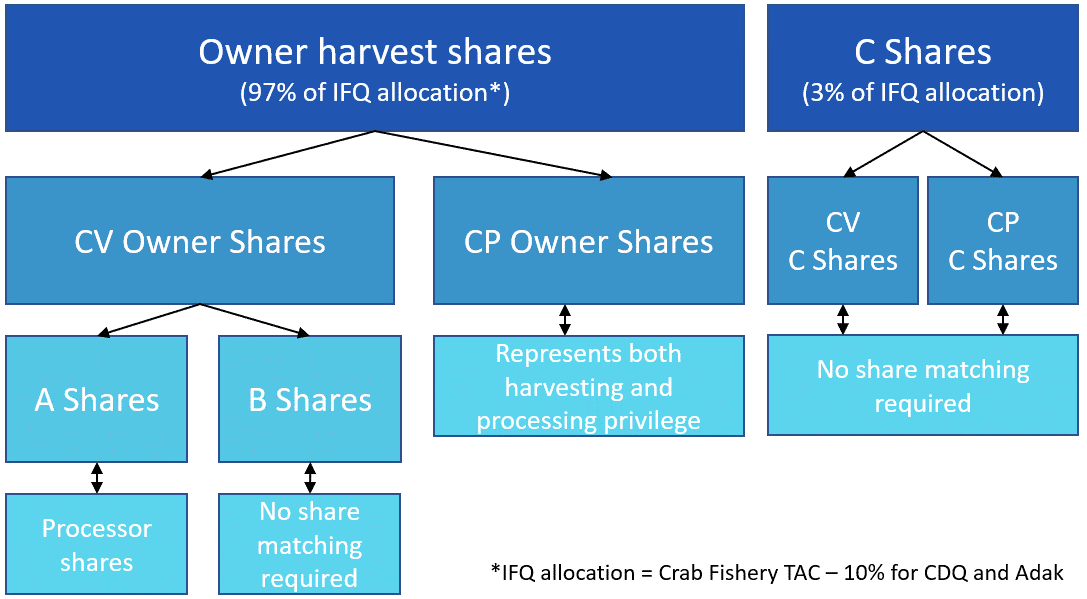The Bering Sea Aleutian Island (BSAI) Crab Rationalization (CR) program is a limited access privilege management program, which was implemented in 2005. The CR program applies to all federal crab fisheries except for Norton Sound red king crab and Pribilof golden king crab. Specifically it includes:
- Bristol Bay red king crab
- Bering Sea snow crab (C. opilio)
- Eastern Bering Sea Tanner crab (C. bairdi) – East of 166º W
- Western Bering Sea Tanner crab (C. bairdi) – West of 166º W
- Pribilof Islands blue and red king crab
- Saint Matthew Island blue king crab
- Western Aleutian Islands (Adak) golden king crab – West of 174º W
- Eastern Aleutian Islands (Dutch Harbor) golden king crab – East of 174º W
- Western Aleutian Islands (Petrol Bank District) red king crab – West of 179º W
The CR program was developed with elements built in to address the interests of harvesters, processors, and communities. The primary elements are:

- Total allowable catch (TAC): A specific catch limit for a fishery.
- Harvesting quota shares (QS): A revocable privilege that allow the holder to harvest a specific percentage of annual TAC. QS fall into three classes. Class A and Class B QS (owner QS) make up 97% of all QS and are issued to catcher vessel owners but differ in that Class A QS must be delivered to a processor holding available PQS. The remaining 3% of QS are designated as Class C QS (crew shares) and are allocated to captains based on their catch histories in the fishery and were developed to protect captain and crew interests.
- Processing shares (PQS): A revocable privilege to receive deliveries of a fixed percentage of the annual TAC from a program fishery.
- Regional landing designations: All Class A QS is regionally designated based on the historic location of the landings and processing that gave rise to the share.
- Catcher processor shares: QS that carry both a harvesting privilege and an accompanying onboard processing privilege issued to catcher processors with historic participation in the fishery.
- Binding arbitration system: Serves to disseminate market information to facilitate negotiations, coordinate the matching of Class A IFQ held by harvesters to IPQ held by processors, and create a process to resolve terms of delivery.
- Cooperatives: Voluntary option for harvesters to form cooperatives associated with one or more processor holding PQS. Cooperatives are intended to facilitate production efficiency by aiding harvesters in coordinating harvest activities among members and deliveries to processors.
- Community Development Quota (CDQ) and Adak community allocations: CDQs are allocated 10% of crab TAC and Adak is issued an annual allocation of the Western Aleutian Island golden king crab fishery.
- Crew loan program: Low interest loans to assist eligible captains and crew in purchasing QS.
- Annual economic data collection (or Economic Data Reports [EDR]): A mandatory census involving reporting of detailed operational and financial information by owners and leaseholders of vessels, processing plants, and Registered Crab Receivers (RCRs) participating in CR program fisheries.
Staff contact is Sarah Marrinan.
Resources
- NOAA Fisheries: BSAI Crab Rationalization Program
- BSAI Crab Fishing Seasons
Reviews of BSAI Crab Rationalization Program
- 10-year Program Review 02/17;
- 5-year Program Review 12/10;
- Executive Summary (only),
- Executive Summary to Appendix A (Social Impact Assessment);
- 3-year Program Review 11/08;
- 18-month Program Review 3/07



